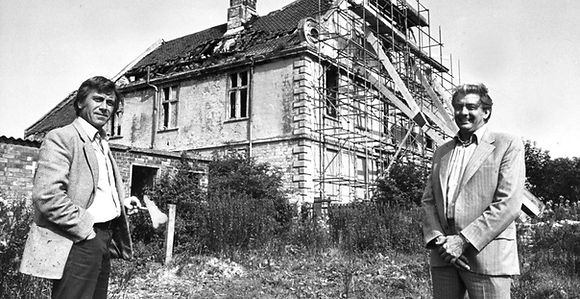
Our History
Content from wikipedia The man responsible for the building of the Hellaby Hall was the Great, Great, Great grandson of John Fretwell, Ralph Fretwell who was baptised in Sheffield on 23 June 1631.
Ralph Fretwell went to Barbados and started a sugar plantation. He became one of the pioneers who laid the foundation of British Trade and prosperity and by his industry he was granted an export licence by Charles II to export horses, bred on the Hellaby estate, to Barbados to turn the mills to crush the sugar cane and in return sugar was imported into the district through the Port of Hull.
By 1700, exports from Barbados exceeded in value those of all North America together. He named the highest mount in Barbados, which happened to be on his estate, “Hillaby Mount”. He is thought to have owned a large part of Philadelphia and he was appointed Chief Justice of Court Justice of Court of Common Pleas in Barbados.
In 1671 he became a Quaker and in 1674 was removed from office because of his beliefs. Numerous prosecutions followed for allowing negroes to attend religious meetings in his house, for not paying church dues and for not carrying out Militia duties. Ralph Fretwell returned to Hellaby around 1688 and commenced building of the present hall, farm and cottages.
Completed in 1692, the Hall was designed in the Jacobean style. The doorway having an open segmental entablature on Tuscan Pilasters. Gables on each side with big, fleshy volutes rising in slopes and curves to a flat top. Three sides of the hall are built of coursed magnesium limestone from local quarries and the front, faced with Roche Ashlar.
With a Dutch impression that was influenced by the style common in the colonies, the Hall was built on a hill and hence an extra storey was required to obtain the height at the front elevation. Ralph Fretwell did not get on well with his wife and so returned to Barbados after the Hall was finished in 1692 and died there in 1701.
In the inventory of his goods at Hellaby (which accompany his will in archives at York) he left £5000 to each of his three daughters, as well as the Hellaby Estate. The younger daughter died before the age of eleven years, the youngest, Mabel, married Dr Samuel Swyfen of Lichfield in 1710.
Swynfen was the godfather of Dr Samuel Johnson and Mabel eventually became the housekeeper of Dr Johnson. The eldest daughter, Dorothy married John Pyott, and it was to her that the estate and adjoining farmlands, descended. The daughter of Dorothy and John Pyott, also named Dorothy, married Peter Johnson, Recorder of York. They had one daughter only, named Dorothea, who became heir representative of the estate and when she married Sir John Eden of West Auckland, the Hellaby Estate came into the Eden family, the most prominent member of the family being Lord Avon, Sir Anthony Eden, former Prime Minister.
The Eden family had no need of Hellaby Hall as their interests were in York. Much of the original staircase and oak panelling were removed and it became a farmhouse for various tenant farmers.
Morrell
Circa 1870–1918 The Hellaby Hall estate was sold by Sir William Eden to the Morrell family in 1870. Sir Anthony Eden, on his retirement, built a house on the Island of Barbados, only a few miles from where Ralph Fretwell’s fortune had been made. The hall was again sold in 1918 to Cliff Carnelly.
Carnelly
Circa 1918–1994 Carnelly was the last resident of Hellaby Hall when he moved out in 1976 and a fire in July 1980 destroyed much of the original inside of the building. For many years it lay in dis – repair whilst the owners of the time and the council determined who should be responsible for the restoration of the hall. A local company finally purchased the estate and with the guidance of English Heritage went about restoring much of the original hall as well extending the facilities to become a hotel. It only opened for three months and stayed closed for nearly four years. On 14 August 1995 Tomorrows Leisure plc acquired Hellaby Hall. Hellaby Hall was expanded with modern buildings, and was reopened in 1995 as a hotel. Hellaby Hall was operated by Prima Hotel Group until January 2016 when AJL Hotel Holdings LTD purchased the property. The hotel was sold in October 2024 to FNH Hotels Ltd.



In more recent times when Hellaby Hall passed to Euroway Estates (North), the company had plans to convert the building and land into a sports and leisure complex but permission was refused in the early 1970s.
The company then sought listed building consent to demolish the hall in 1976 but this was also refused and Rotherham Council was ordered to buy it by the Department of the Environment.
The building became a regular target for vandals. In August 1980 it was extensively damaged by fire and a year later it was sold to a local businessman for £500 on condition he restore it into a pub restaurant and hotel. He did not and at one stage extensive work had to be carried out to make the building safe.
The Hall then went to Frewvale Construction Ltd and, in the late 1980s, to the Lancashire and Yorkshire Assurance Society.
It was redeveloped on their behalf by Whitley Geddes Developments as a hotel, and was opened during October 1991 in a blaze of publicity by the stars of TV’s Bergerac series, John Nettles and Terence Alexander.

Disappointingly, it closed within five months. Tomorrow’s Leisure bought the building for approx. £1.8 million reopening it as a hotel once more in August 1995. It still thrives today even though further ownership changes have occurred.


